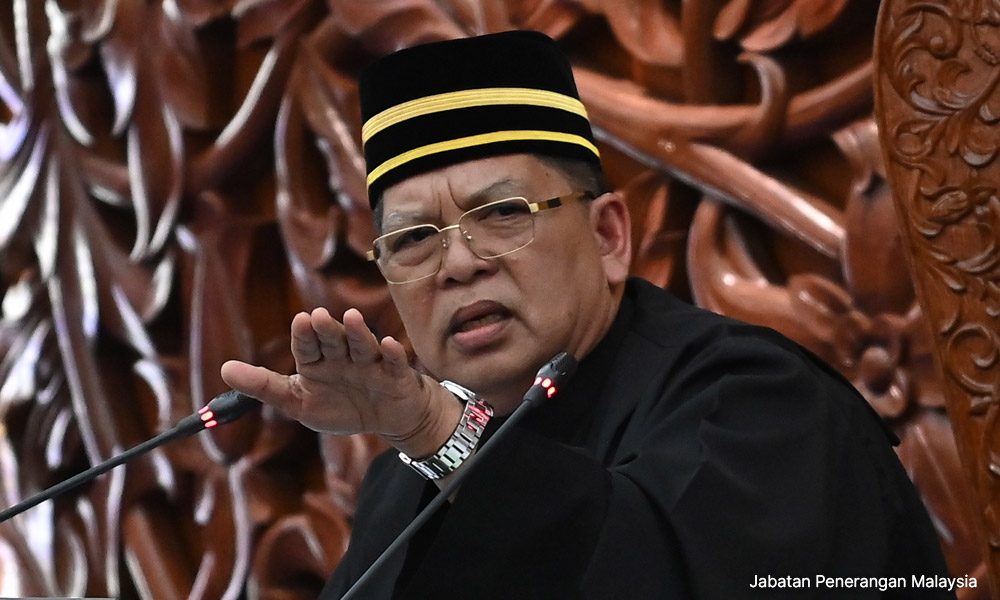There has been a lot more profanity on social media, in the last decade.
Politicians and prominent members of civil society are resorting to curse words and vile vulgarity in their tweets, Facebook posts, and Instagram videos. This is a global phenomenon, and Malaysia is very much in tune.
GovPredict is a US-based company that provides research, analytics and intelligence for winning public affairs campaigns. Its recent study revealed that lawmakers in the US had drastically increased the number of times they have used curse words.
A particular common curse word is the “F” word on social media. Other research shows that these swearwords account for two of the top 10 words used by left-leaning tweeters, while those on the right show a preference for “God” and religious or spiritual “scripture”.
Recently, a prominent Malaysian lawyer and a popular member of civil society uttered the “F” word twice. In a video uploaded on social media, she hurled her caustic remarks at Bar Council members who failed to turn up for the annual general meeting.
Dewan Rakyat Speaker Johari Abdul announced last month that he intends to be stricter in the future. He will impose the existing provisions to fine foul-mouthed lawmakers.

Yes indeed, lawmakers should be fined for their grotesque rudeness, and for being unnecessarily crude, with their sexist, racist insinuations.
They took an oath to serve the people, and voters do not appreciate their rude outbursts. Fining them and giving them a thorough dressing down in dignified language, is the most effective way to shut these people up.
Malaysians are actually very accustomed to the filth that gushes from our politicians’ mouths. We have had regular doses from across the political divide. However, it is extra disheartening when members of civil society get on the bandwagon.
Civil society is an essential building block of development and national cohesion. Civil society is supposed to complement government, and in ideal societies, the two remain separate but effective.
Ideally, civil society space must remain untouched by the executive arm of the government and is also separate from the private sector.
Civil society comprises universities, schools, academicians, public intellectuals, religious organisations, think tanks, community activists, charitable organisations, and NGOs such as trade unions and employers’ associations.
These groups are important sources of information for the public and government. They also monitor the government and private sector policies and transgressions.
In order to hold them accountable, civil society must communicate logically, compassionately and with dignity.
Learn to engage with wisdom
To be taken seriously, civil society must earn the respect of all communities. They should be engaging and project a certain level of intelligence.
This indicates that they are up to date with the issues they are advocating for. In the long run, an informed activist is more effective than a noisy and rude one.
They must carry themselves with dignity, tact and humility. In the Malaysian context, we are used to politicians and their followers uttering barbaric and uncivilised language.
Furthermore, curbing one’s propensity to use profanity in public has very little to do with the notion of freedom of speech. Let us not get carried away with this debate.
Apart from curse words, active members of civil society must avoid using wordy and complicated sentences in their popular writing, media comments, or public talks.
Learn how to be engaging. Get your message across - succinctly and quickly. People seldom have the patience to listen or read endlessly. Big words and clever sarcasm, although may be a creative work of literary art, are an utter waste of time in this context.
Many “old timers” (like myself) must refrain from using paragraph-long sentences. In whatever language we write and speak, we should be skilled in combining correct grammar with simple colloquialisms that appeal to our various communities, across different age groups. Always give examples that reflect daily life, and common happenings.
The main objective of civil society is to deliver services that can enhance government and private sector policies.
You need to be understood and influence the mindsets of others. If the intention of civil society is to advocate for long-term social cohesion, it is better to stay decent, win hearts and use compassionate and simple language.
Civil society could be extremely effective if there are more informed activists and NGOs. The irony is that because of the wealth of information out there, people are reading less. Call this “information overload” I suppose.
Therefore, resorting to foul language grabs attention quickly. There may actually be a method to this madness, but I doubt it will succeed in a country like Malaysia.

Politicians and civil society activists are swearing out more in the open due to something called voter/viewer psychology. This is according to research done by an American professor. In his book titled “What the F”, Benjamin K Bergen analysed the psychology of swearing.
He writes: “When you hear profanity your body reacts and it reacts in a strong way… you release adrenaline, you start to sweat, your heart rate increases, blood pressure increases, your pupils dilate, you are ready to fight or to flee.”
This professor also believes that this is the exact reaction politicians and civil society activists want to evoke. The assumption is that the audience is now ready to listen to them.
However, how true is this in the Malaysian context? We may be willing to listen to someone who is caustic and vulgar for Facebook entertainment. Yet, we would probably think twice before electing this same person to represent us in Parliament.
Cursing around people who are already prepared to agree with you can draw a positive group reaction. “The converted” or ingroup members interpret the use of vulgarities as “the person being more truthful, more direct and more honest.”
However, I doubt any member of civil society with political aspirations has a chance of attracting a huge number of votes if they use caustic language and behave distastefully.
Given the long history in this country of ineffective, arrogant and uncouth lawmakers, it is unlikely the people would want to put up with more of this in the future.
Malaysia needs to maintain an effective civil society minus the use of profanity. This is Malaysia Madani after all. We should try to be civilised. - Mkini
SHARIFAH MUNIRAH ALATAS is a retired academician with zero tolerance for corrupt, arrogant, and frivolous leadership.
The views expressed here are those of the author/contributor and do not necessarily represent the views of MMKtT.



No comments:
Post a Comment
Note: Only a member of this blog may post a comment.